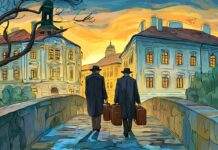Surkov sam je očitno paradoksna oseba: avtoritaren spletkar iz kremeljskih hodnikov, ki vzbuja splošno strahospoštovanje in avtor Putinovega kulta (Putin kot pravi moški, ki lovi medvede na Kamčatki …), je istočasno pod psevdonimom avtor literarne kriminalke, v kateri je glavni junak pokvarjeni PRovec, ki brez moralnih zadržkov služi komurkoli, ki ima moč in denar.
To situacijo, ko je mogoče biti istočasno despot in kritik despotizma, v državi, “ki je zjutraj diktatura, v času kosila demokracija, za večerjo pa oligarhija,” kjer se v koreografirani demokraciji na oblasti izmenuje par Putin (“avtoritarec) / Medvedev (“liberalec”) – opisuje Pomerantsev kot bizarno izpolnitev postmodernizma. Kjer nobena realnost ni dokončna in je mogoče vsako stališče kadarkoli spremeniti – in pri tej spremembi niti ne zardimo, saj se obranimo s “samoironijo”
This fusion of despotism and postmodernism, in which no truth is certain, is reflected in the craze among the Russian elite for neuro-linguistic programming and Eriksonian hypnosis: types of subliminal manipulation based largely on confusing your opponent, first developed in the US in the 1960s. There are countless NLP and Eriksonian training centres in Moscow, with every wannabe power-wielder shelling out thousands of dollars to learn how to be the next master manipulator. Newly translated postmodernist texts give philosophical weight to the Surkovian power model. François Lyotard, the French theoretician of postmodernism, began to be translated in Russia only towards the end of the 1990s, at exactly the time Surkov joined the government. The author of Almost Zero loves to invoke such Lyotardian concepts as the breakdown of grand cultural narratives and the fragmentation of truth: ideas that still sound quite fresh in Russia. One blogger has noted that ‘the number of references to Derrida in political discourse is growing beyond all reasonable bounds. At a recent conference the Duma deputy Ivanov quoted Derrida three times and Lacan twice.’ In an echo of socialism’s fate in the early 20th century, Russia has adopted a fashionable, supposedly liberational Western intellectual movement and transformed it into an instrument of oppression. (*)







